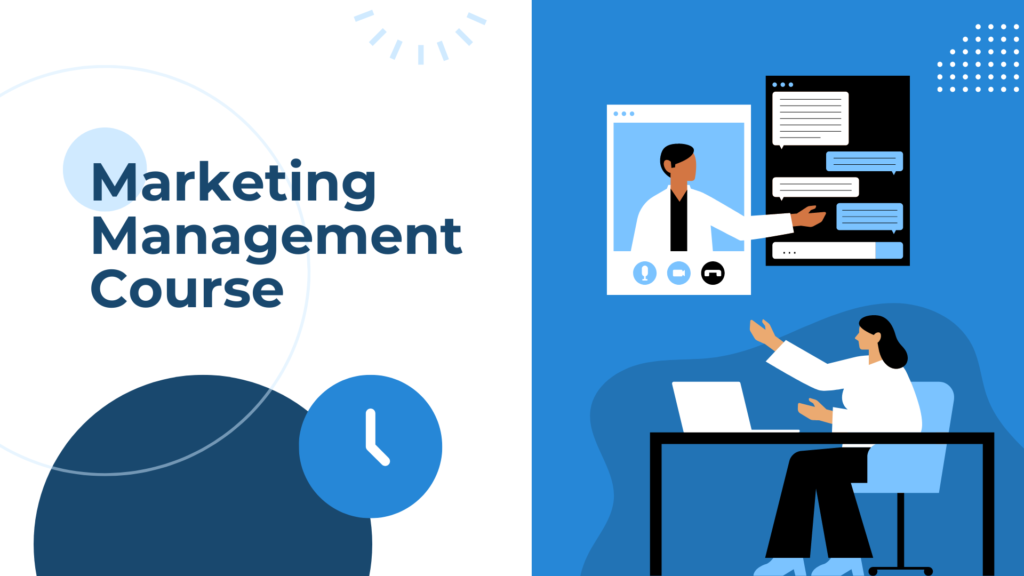
What is Marketing Management Course?
Marketing Management Course In today’s competitive business landscape, understanding the principles and practices of marketing management is crucial for anyone looking to advance their career in marketing.
A marketing management course offers comprehensive insights into the strategic planning, implementation, and control of marketing programs. Here,
we explore the various benefits and key components of a marketing management course.
1. In-Depth Knowledge of Marketing Principles:- One of the main benefits of a marketing management course is the in-depth knowledge it provides about fundamental marketing principles. Students learn about market research, consumer behavior, product development, and the 4 Ps of marketing: Product, Price, Place, and Promotion. This foundational knowledge is essential for making informed marketing decisions.
2. Strategic Marketing Skills:- A marketing management course equips students with strategic marketing skills. This includes the ability to develop comprehensive marketing plans, conduct SWOT analyses, and identify target markets. These skills are vital for creating effective marketing strategies that align with business goals and drive growth.
3. Practical Application and Case Studies:- A significant component of a marketing management course is the practical application of theoretical concepts. Many courses incorporate case studies and real-world projects, allowing students to apply what they’ve learned in practical scenarios. This hands-on experience is invaluable for understanding the complexities of marketing management and preparing for real-world challenges.
4. Digital Marketing Integration:- In today’s digital age, a marketing management course often includes modules on digital marketing. Students learn about online marketing strategies, social media marketing, SEO, content marketing, and data analytics. Integrating digital marketing skills is crucial for creating comprehensive marketing strategies that leverage both traditional and digital channels.
5. Enhanced Analytical Skills:- Another benefit of a marketing management course is the development of strong analytical skills. Students learn how to analyze market data, measure campaign performance, and use various analytical tools.
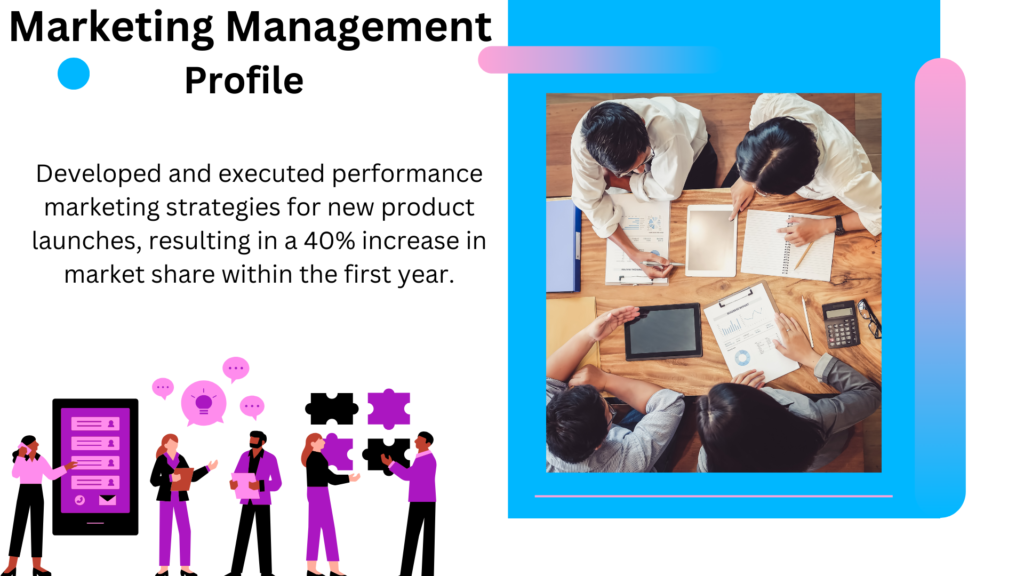
6. Leadership and Team Management:- A marketing management course also focuses on developing leadership and team management skills. Students learn how to lead marketing teams, manage projects, and coordinate with other departments. Effective leadership is crucial for executing successful marketing campaigns and achieving organizational objectives.
7. Networking Opportunities:- Enrolling in a marketing management course provides valuable networking opportunities. Students have the chance to connect with industry professionals, instructors, and peers. These connections can lead to internships, job opportunities, and collaborations, enhancing career prospects in the marketing field.
8. Career Advancement:- One of the most significant benefits of a marketing management course is career advancement. Whether you are a recent graduate or a working professional, the skills and knowledge gained from a marketing management course can open up a wide range of job opportunities. Positions such as marketing manager, brand manager, market research analyst, and product manager are just a few examples of careers that benefit from this training.
9. Certification and Credibility:- Completing a marketing management course often results in certification, which adds credibility to your professional profile. A certification in marketing management demonstrates a commitment to professional development and a high level of expertise, making you more attractive to potential employers.
10. Staying Competitive in the Market:- The marketing landscape is constantly evolving, and staying competitive requires continuous learning. A marketing management course keeps you updated with the latest trends, technologies, and best practices in marketing. This knowledge allows you to implement innovative strategies and maintain a competitive edge in the market.
What is Performance Marketing Course?
Performance Marketing Course In the digital age, performance marketing has emerged as a critical strategy for businesses looking to maximize their return on investment (ROI). Unlike traditional marketing, which often focuses on brand awareness, performance marketing is driven by measurable results and specific goals. Enrolling in a performance marketing course offers a plethora of advantages for aspiring marketers and seasoned professionals alike. Here, we delve into the key benefits and components of a performance marketing course.
1. Comprehensive Understanding of Performance Marketing:- A performance marketing course provides a thorough understanding of the core principles and practices of performance marketing. Students learn about various performance marketing channels, including affiliate marketing, search engine marketing (SEM), social media advertising, and programmatic advertising. This comprehensive knowledge is essential for developing and executing effective performance marketing campaigns.
2. Data-Driven Decision Making:- One of the primary benefits of a performance marketing course is the emphasis on data-driven decision making. Students learn how to track, analyze, and interpret key performance indicators (KPIs) and metrics such as cost per acquisition (CPA), return on ad spend (ROAS), and customer lifetime value (CLV). These skills enable marketers to optimize campaigns in real-time and make informed decisions that drive results.
3. Hands-On Experience with Tools and Platforms:- A performance marketing course typically includes hands-on training with industry-standard tools and platforms. Students gain practical experience with Google Ads, Facebook Ads Manager, Google Analytics, and various affiliate marketing networks. This hands-on experience is invaluable for understanding how to set up, manage, and optimize performance marketing campaigns.
4. Strategic Campaign Planning:- Another crucial component of a performance marketing course is strategic campaign planning. Students learn how to set clear, measurable objectives and develop strategies to achieve them. This includes audience targeting, budget allocation, creative development, and A/B testing. Strategic planning skills are vital for ensuring that performance marketing efforts align with overall business goals.
5. Optimization Techniques:- Optimization is at the heart of performance marketing. A performance marketing course teaches students various optimization techniques, including bid management, ad copy testing, landing page optimization, and conversion rate optimization (CRO). These techniques help marketers improve the efficiency and effectiveness of their campaigns, ultimately leading to better performance and higher ROI.

6. Real-World Case Studies:- Many performance marketing courses incorporate real-world case studies to illustrate successful campaigns and common pitfalls. Analyzing these case studies helps students understand practical applications of theoretical concepts and learn from the successes and mistakes of others. This knowledge is crucial for developing successful performance marketing strategies.
7. Certification and Professional Credibility:- Completing a performance marketing course often results in a certification that adds credibility to a marketer’s professional profile. A certification in performance marketing demonstrates a high level of expertise and commitment to ongoing professional development. This can enhance job prospects and career advancement opportunities in the competitive marketing field.
8. Networking Opportunities:- Enrolling in a performance marketing course provides valuable networking opportunities. Students can connect with industry experts, instructors, and peers, fostering professional relationships that can lead to job opportunities, collaborations, and mentorship. Building a strong professional network is essential for career growth in performance marketing.
9. Staying Updated with Industry Trends:- The field of performance marketing is constantly evolving, with new tools, technologies, and best practices emerging regularly. A performance marketing course ensures that students stay updated with the latest industry trends and developments. This knowledge allows marketers to implement cutting-edge strategies and maintain a competitive edge.
10. Career Advancement:- One of the most significant benefits of a performance marketing course is career advancement. Whether you are a recent graduate or an experienced marketer, the skills and knowledge gained from a performance marketing course can open up a wide range of job opportunities. Roles such as performance marketing manager, PPC specialist, and digital marketing strategist are just a few examples of careers that benefit from this training.
What is Social Media Marketing Course?
Social Media Marketing Course In today’s digital landscape, social media has become a powerful tool for businesses to connect with their audience, build brand awareness, and drive sales. Enrolling in a social media marketing course offers numerous benefits for those looking to excel in this dynamic field. This comprehensive guide explores the key components and advantages of a social media marketing course.
1. Understanding Social Media Platforms:-A social media marketing course provides an in-depth understanding of various social media platforms, including Facebook, Instagram, Twitter, LinkedIn, TikTok, and Pinterest. Students learn the unique features, audience demographics, and best practices for each platform, enabling them to tailor their strategies effectively.
2. Creating Engaging Content:- One of the primary benefits of a social media marketing course is learning how to create engaging and compelling content. The course covers different types of content, such as images, videos, stories, and live streams. Students gain insights into content creation tools and techniques that capture audience attention and foster engagement.
3. Developing Social Media Strategies:- A key component of a social media marketing course is strategy development. Students learn how to set clear, measurable goals and create comprehensive social media strategies that align with overall business objectives. This includes audience research, competitor analysis, and campaign planning.
4. Mastering Advertising Techniques:- Social media advertising is a crucial aspect of any marketing strategy. A social media marketing course teaches students how to create and manage effective ad campaigns on platforms like Facebook Ads Manager and LinkedIn Campaign Manager. This includes targeting the right audience, setting budgets, and analyzing ad performance.
5. Analytics and Performance Tracking:- Another vital part of a social media marketing course is learning how to track and analyze performance metrics. Students gain proficiency in using analytics tools to monitor key performance indicators (KPIs) such as engagement rates, click-through rates (CTR), and conversion rates. This data-driven approach helps in optimizing campaigns and achieving better results.
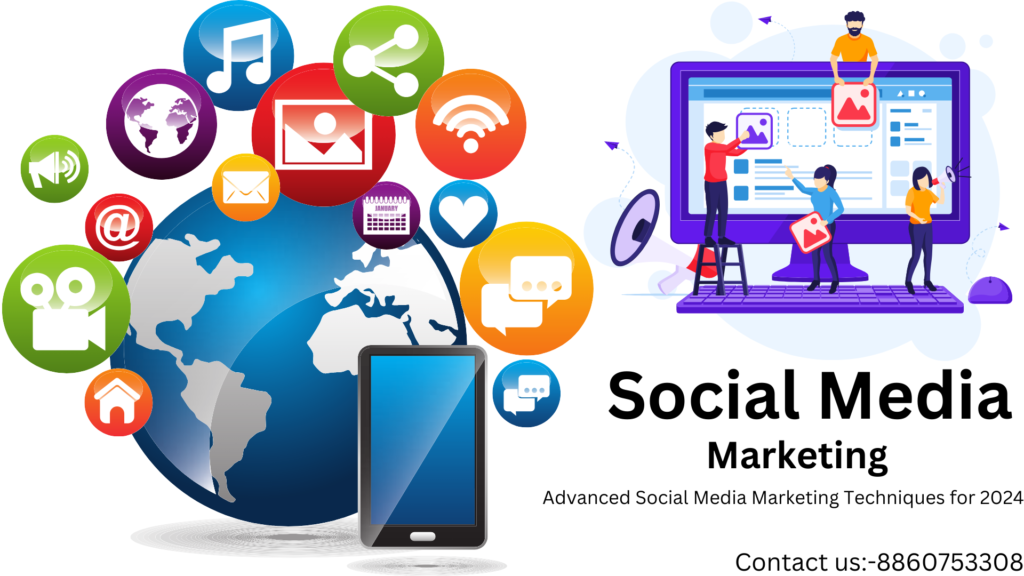
6. Community Management:- Community management is essential for building and maintaining a loyal audience. A social media marketing course covers techniques for engaging with followers, responding to comments and messages, and managing online communities. Effective community management fosters a positive brand image and enhances customer relationships.
7. Staying Updated with Trends:- The social media landscape is constantly evolving, with new trends and features emerging regularly. A social media marketing course ensures that students stay updated with the latest industry trends and best practices. This knowledge allows marketers to implement innovative strategies and maintain a competitive edge.
8. Certification and Professional Credibility:- Completing a social media marketing course often results in certification, adding credibility to one’s professional profile. Certified social media marketers are viewed as knowledgeable and skilled, making them more attractive to potential employers and clients. Certification also demonstrates a commitment to professional development.
9. Networking Opportunities:- Enrolling in a social media marketing course provides valuable networking opportunities. Students can connect with industry professionals, instructors, and peers, building relationships that can lead to job opportunities, collaborations, and mentorship. A strong professional network is crucial for career growth in social media marketing.
10. Career Advancement:- One of the most significant benefits of a social media marketing course is career advancement. Whether you’re a recent graduate or an experienced marketer, the skills and knowledge gained from the course can open up various job opportunities. Roles such as social media manager, content strategist, and digital marketing specialist are just a few examples of careers that benefit from this training.
What is Marketing Agency?
Unlock Your Business Potential with a Professional Marketing Agency In today’s highly competitive digital landscape, businesses must leverage effective marketing strategies to stand out and thrive. A professional marketing agency can be your ultimate partner in navigating this complex environment, offering expertise, creativity, and results-driven approaches to elevate your brand. Here’s how partnering with a marketing agency can transform your business:
1. Expertise and Experience A reputable marketing agency brings a wealth of knowledge and experience to the table. With a team of seasoned professionals specializing in various aspects of marketing, including digital, social media, SEO, content creation, and more, a marketing agency can provide comprehensive solutions tailored to your business needs. Their expertise ensures that your marketing campaigns are strategic, innovative, and effective.
2. Access to Advanced Tools and Technologies Marketing agencies have access to the latest tools and technologies that can enhance the efficiency and effectiveness of your marketing efforts. From advanced analytics and automation platforms to cutting-edge design software, these tools enable precise targeting, detailed performance tracking, and seamless campaign management, providing a competitive edge in the market.
3. Cost-Effective Solutions Hiring a full-time, in-house marketing team can be expensive and time-consuming. By working with a marketing agency, you gain access to a team of experts without the overhead costs associated with hiring and training employees. This cost-effective approach allows you to allocate resources more efficiently and focus on other critical aspects of your business.
4. Scalable Services As your business grows, so do your marketing needs. A marketing agency offers scalable services that can adapt to your evolving requirements. Whether you need to ramp up your efforts during peak seasons or scale back during slower periods, a marketing agency can adjust its strategies and resources to match your business’s changing demands.
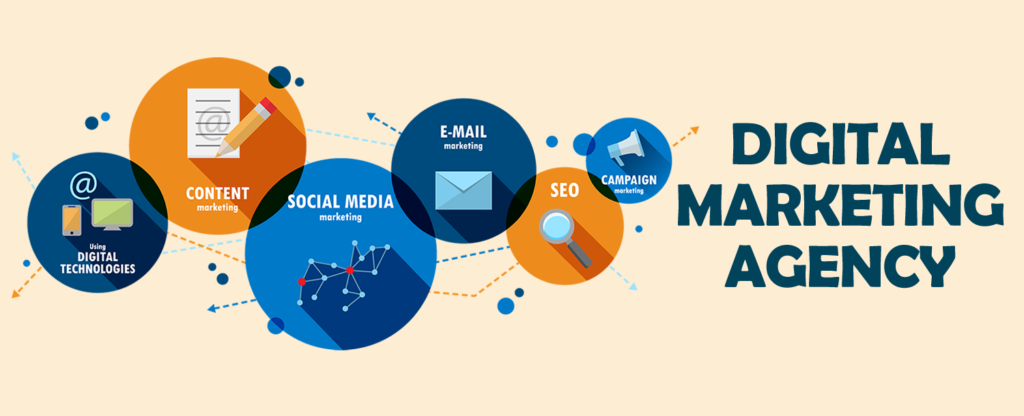
5. Creative and Innovative Campaigns Marketing agencies thrive on creativity and innovation. They stay abreast of the latest industry trends and best practices, ensuring your campaigns are fresh, engaging, and impactful. By leveraging their creative expertise, a marketing agency can craft compelling content, eye-catching visuals, and innovative campaigns that resonate with your target audience and drive results.
6. Enhanced Focus on Core Business Activities Partnering with a marketing agency allows you to focus on what you do best – running your business. By outsourcing your marketing needs, you can concentrate on core business activities, such as product development, customer service, and operations, while the agency handles the complexities of marketing strategy and execution.
7. Data-Driven Strategies A key advantage of working with a marketing agency is their ability to develop data-driven strategies. They utilize analytics and performance metrics to track the success of your campaigns, identify areas for improvement, and make informed decisions. This approach ensures that your marketing efforts are continuously optimized for maximum return on investment (ROI).
8. Measurable Results Marketing agencies are results-oriented, focusing on delivering measurable outcomes that align with your business goals. They provide regular reports and insights into campaign performance, allowing you to see the tangible impact of your marketing investments. This transparency helps build trust and ensures accountability.
What is Education Marketing Agency?
Elevate Your Institution with an Education Marketing Agency In the increasingly competitive world of education, attracting and retaining students requires more than just traditional marketing methods. An education marketing agency specializes in crafting strategic, data-driven, and innovative campaigns tailored specifically to educational institutions. Whether you’re a university, college, private school, or online learning platform, partnering with an education marketing agency can significantly boost your visibility, enrollment rates, and overall success. Here’s how:
1. Specialized Expertise An education marketing agency brings specialized expertise in promoting educational institutions. They understand the unique challenges and opportunities within the education sector and are adept at developing strategies that resonate with prospective students, parents, and educators. Their in-depth knowledge ensures your marketing campaigns are both relevant and effective.
2. Targeted Campaigns Education marketing agencies excel at creating targeted campaigns that reach your specific audience. By leveraging data analytics and market research, they can identify and engage with potential students who are the best fit for your programs. This precise targeting increases the likelihood of attracting qualified applicants and reduces wasted marketing spend.
3. Digital Presence Enhancement In today’s digital age, having a strong online presence is crucial. An education marketing agency can optimize your digital footprint through SEO, content marketing, social media management, and paid advertising. These efforts ensure your institution appears prominently in search results and reaches a broader audience across various digital platforms.
4. Compelling Content Creation Content is king in the world of digital marketing. An education marketing agency can create high-quality, engaging content that showcases your institution’s strengths and unique offerings. From blog posts and videos to infographics and testimonials, compelling content helps build your brand and attracts potential students by highlighting the value of your educational programs.
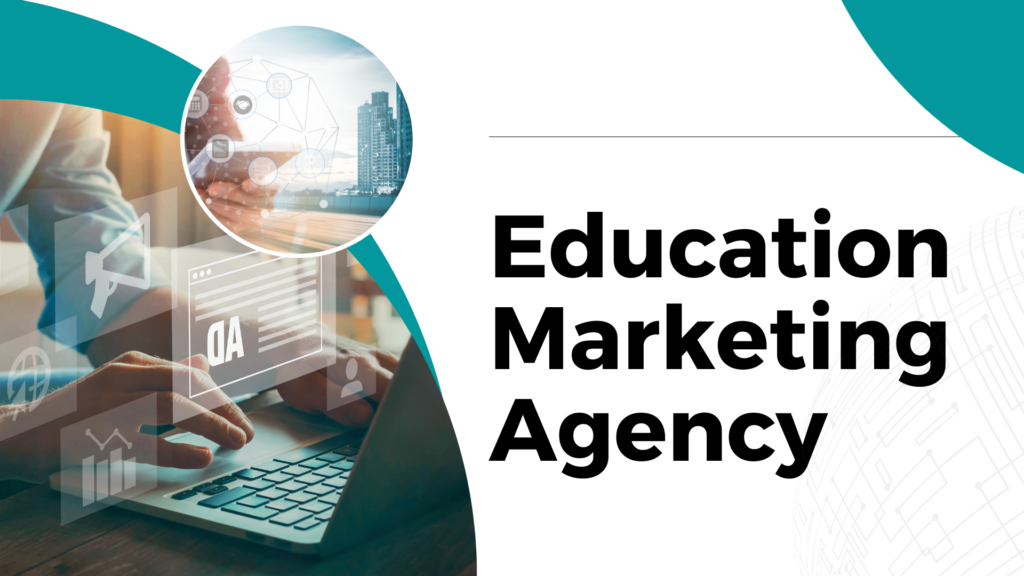
5. Brand Development A strong brand identity sets your institution apart from competitors. Education marketing agencies help develop and refine your brand, ensuring it reflects your values, mission, and unique attributes. A well-defined brand builds trust and credibility, making your institution more attractive to prospective students and their families.
6. Enhanced Student Engagement Effective marketing is not just about attracting students but also about engaging them throughout their educational journey. Education marketing agencies use a variety of tactics, such as personalized email campaigns, social media interactions, and virtual events, to keep current and prospective students engaged and informed about your institution’s offerings and updates.
7. Data-Driven Insights An education marketing agency utilizes data analytics to measure the success of marketing campaigns and make informed decisions. By analyzing metrics such as website traffic, conversion rates, and engagement levels, they can refine strategies to improve outcomes. This data-driven approach ensures that your marketing efforts are continuously optimized for better results.
8. Cost-Effective Solutions Hiring a full-time, in-house marketing team can be costly. Partnering with an education marketing agency provides access to a team of experts at a fraction of the cost. This cost-effective solution allows you to allocate resources more efficiently while still benefiting from professional marketing services.
9. Flexibility and Scalability An education marketing agency offers flexible and scalable services that can adapt to your institution’s needs. Whether you need a comprehensive marketing strategy or specific services like social media management or SEO, an agency can tailor their offerings to suit your requirements, ensuring your marketing efforts grow alongside your institution.
No Fields Found.
Thank you for your sharing. I am worried that I lack creative ideas. It is your article that makes me full of hope. Thank you. But, I have a question, can you help me?
Thank you for your sharing. I am worried that I lack creative ideas. It is your article that makes me full of hope. Thank you. But, I have a question, can you help me?
I don’t think the title of your article matches the content lol. Just kidding, mainly because I had some doubts after reading the article.